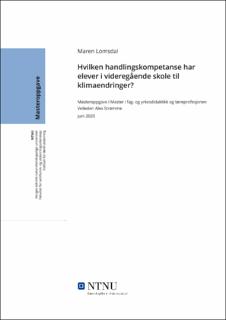Hvilken handlingskompetanse har elever i videregående skole til klimaendringer?
Master thesis
Permanent lenke
https://hdl.handle.net/11250/2784899Utgivelsesdato
2020Metadata
Vis full innførselSamlinger
- Institutt for lærerutdanning [3403]
Sammendrag
Sammendrag Høsten 2020 trer de nye læreplanene i kraft. Bærekraftig utvikling utgjør et av de tverrfaglige temaene i fagfornyelsen. Et av målene med utdanning for bærekraftig utvikling (UBU) er å ruste elevene til å leve gode bærekraftige liv i fremtiden. Elevene skal også lære hvordan de kan bidra til at de menneskene som lever i dag og de som skal leve i fremtiden, kan ha gode levevilkår. Fremtiden vil være preget av mye usikkerhet (Sinnes, 2015). «Realisering av en bærekraftig utvikling krever aktiv deltakelse fra samfunnsborgere med handlingskompetanse. For å oppnå dette, er det helt nødvendig at vi integrerer utdanning for bærekraftig utvikling i utdanningssystemet» (Majken Korsager & Scheie, 2017).Målet med denne studien har vært å undersøke hvilken handlingskompetanse elever i videregående skole har i forhold til klimaendringer. I studien har jeg benyttet meg av en forenklet modell av handlingskompetanse beskrevet av Pär Nygren (2008) og Helen Jeffrey (2010), den danner utgangspunktet for studiens teori og blir brukt som det analytiske verktøyet i studien. NOU 1991: 4 (s.6) sin definisjon av handlingskompetanse; kunnskaper, ferdigheter og holdninger, danner utgangspunktet for studiens inndeling i forskningsspørsmål.I studien ble det gjennomført en spørreundersøkelse av 91 elever ved to ulike avdelinger ved en videregående skole i Nord-Norge. Spørreundersøkelsen dannet grunnlaget for studiens kvalitative intervju av fem elever, som utgjorde studiens primærkilde. Studien resultater tyder på at elevene i stor grad er enige i at klimaendringene skyldes menneskelig påvirkning. Elevene opplever selv at de har gode kunnskaper om konsekvensene som følge av et endret klima, men de savner kunnskap og informasjon om tiltak de selv kan gjøre. Elevene fremhever samarbeid som en viktig faktor for å redusere klimaendringene.
Nøkkelord: Utdanning for bærekraftig utvikling (UBU), bærekraftig utvikling (BU) og handlingskompetanse. Abstract
In fall of 2020, the revised National Curriculum will take effect. Sustainable Development are one of three interdisciplinary themes in “Fagfornyelsen”. One of the main goals in educating pupils in Sustainable Development (UBU), is to give them the them knowledge and competence to live good and sustainable lives in the future. The pupils are also supposed to learn how they can contribute to people now and, in the future, will have good living conditions. The future is uncertain. (Sinnes, ,2015, fritt oversatt) “To implement Sustainable Development demands active participation from citizens with the competence and ability to act. To achieve this, it is crucial that we are integrating Sustainable Development in our educational system” (Korsager & Scheie, 2017, fritt oversatt). The aim of this study has been to research to what degree Norwegian Upper Secondary pupils has the action competence in relation to climate changes. In this study I have used a simplified model that describes Action Competence, derived from Per Nygren (2008) and Helen Jeffery(2010).The model will be the foundation for the theoretical part of this study, as well as the tool used in the analytical part.NOU 1991:4 (p.6) defines action competence as knowledge, skills and attitude, and this definition is the basis for the sectionalizing of the research questions in this study. A questionnaire was answered by 91 Upper Secondary pupils at to different departments in a school in Nord-Norge. The questionnaire is the basis for the qualitative interviews. They are the primary source of this study and conducted with five pupils. The result of the study indicates that the pupils to a large degree are looking at climate change as a result of human behaviour. The result also indicates that they feel they have knowledge about what causes climate changes, but lack knowledge and information about how they personally can take action. The pupils highlight that cooperation is a crucial factor to reduce climate changes.
Keywords: Education for sustainable development (ESD), sustainable development (SD) and action competence.
